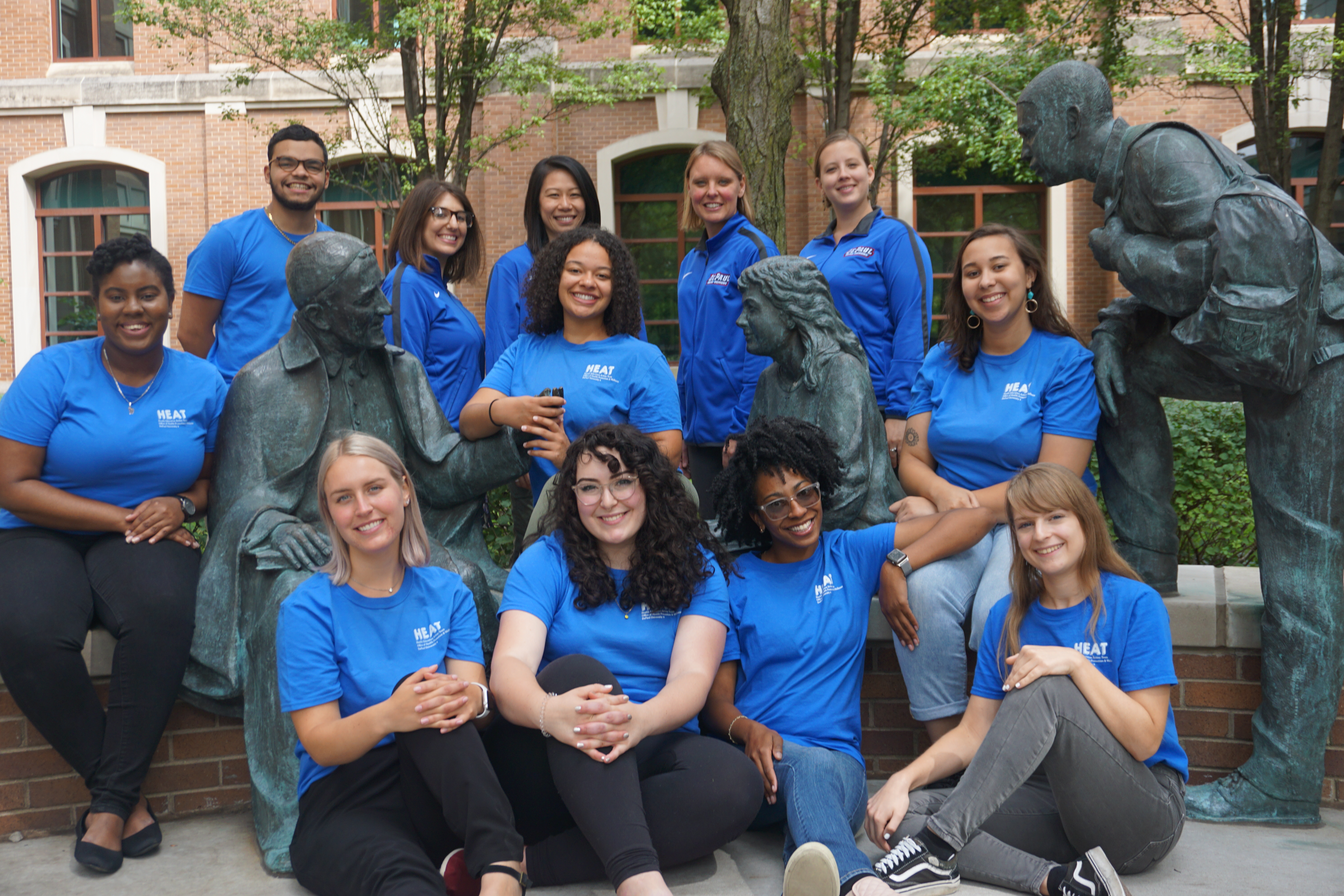 The staff of DePaul's Office of Health Promotion and Wellness (pictured above in a photo taken prior to the COVID-19 outbreak) are available to help during this time of social distancing. (DePaul University/Jessica Peterson)
The staff of DePaul's Office of Health Promotion and Wellness (pictured above in a photo taken prior to the COVID-19 outbreak) are available to help during this time of social distancing. (DePaul University/Jessica Peterson)As we all adjust to the new normal and find ways to create an environment that supports our academics, work life and well-being, DePaul Health Promotion and Wellness wants to provide some tangible tips to support your well-being and those around you.
Healthy Routine
The hardest part of working from home can be the lack of structure in your day. Create a schedule to keep your days organized and structured so you can meet your deadlines. Start with a consistent routine by waking up at the same time every day and preparing for your day, which might include showering, eating breakfast and commuting. Try going for a walk around your neighborhood to count as your commute, which will allow you to get some fresh air and some movement in your day. Once you get back home, open up your laptop or books and get started on your work.
Be sure to take breaks every other hour, whether that is a bathroom break, walk around your place or stretches at your desk. Take time for lunch by stepping away from your computer and other technology screens. A break might also include a moment of meditation or a few deep breaths to center yourself. Once you get back to your work, set timers to take breaks or to signal when it is time to stop working.
 One tip from Health Promotion and Wellness to help manage stress during social distancing is to continue to do what makes you laugh, smile and feel joyful. (Photo courtesy of Health Promotion and Wellness)
One tip from Health Promotion and Wellness to help manage stress during social distancing is to continue to do what makes you laugh, smile and feel joyful. (Photo courtesy of Health Promotion and Wellness)
Maintain Connection
Once you are finished with your work, make time to get social. Whether that is a phone call, zoom session or a solo night of relaxation. Whatever you decide to do, ask yourself: How is this caring for my well-being and does this make me happy? Set an intention to enjoy your free time and perhaps take up a new hobby or skill.
A great way to power down at night is to create a nightly routine. This could look like tech-free time, doing a face mask, journaling or reading a book before bedtime. Creating a nightly routine free from technology can help increase our melatonin production, which helps our circadian rhythms and signals to our bodies that it is bedtime. Tech-free time is especially important now since we are spending more time on screens for work, school and connecting.
Set Boundaries
Another helpful strategy for working and learning from home is to set physical boundaries. This can include making a separate section of your home dedicated for your work or academics. It can be difficult to achieve this if you live with others who are also working from home or have a smaller space to work with, but any physical barrier can be helpful. Communicating with those you live with about your work or academic schedule and your social schedule can also be helpful to free you from distractions and encourage support for one another. Be sure you are also setting boundaries with yourself. We can easily start working longer days than usual because we aren’t leaving our houses, but it is important to stick to your time boundaries and make time for life outside of academics and work life.
To help you thrive, we’ve come up with some quick tips:
- Aim for 8-10 hours of sleep daily.
- Avoid sleeping in if you really do not need to.
- Stay hydrated with water — be mindful of your caffeine intake.
- Schedule it — organize your academics, work and social time.
- Check in with yourself often, “How am I, what do I need?”
- Limit your exposure to the news — too much information can negatively impact our well-being.
- Do what makes you laugh, smile and feel joyful.
- Maintain your self-care routine — if you don’t have any practices, now is the perfect time to begin.
Active Minds is also a great resource to learn strategies for healthy connection, visit its
website for more resources. Also, visit our new blog
here where you can view last week’s webinar on “Coping with COVID.”
We hope you have a great spring quarter and know that you can continue to
reach out to HPW for all of the same programs and services.
Take Care DePaul!